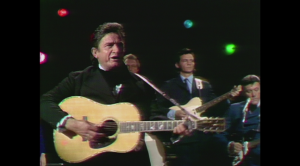
Johnny Cash, the iconic baritone voice of country music, has left an indelible mark on the genre and popular culture at large. His ability to craft raw, emotionally resonant narratives, often drawing from the depths of human experience, has solidified his status as one of music’s most enduring figures. Among his vast repertoire, few songs capture the essence of Cash’s artistry as potently as “Folsom Prison Blues”.
Background
Released in 1955, “Folsom Prison Blues” was one of the earliest hits to propel Cash into the spotlight. The song, with its stark imagery and haunting melody, immediately resonated with audiences, offering a glimpse into the world of the incarcerated and the longing for freedom. Yet, it was the 1968 live recording at Folsom State Penitentiary that truly cemented the song’s legendary status.
The prison concert was a watershed moment in Cash’s career, a daring experiment that paid off spectacularly. By performing for a captive audience of inmates, Cash created an atmosphere of raw authenticity that transcended the boundaries of the music industry. The resulting album, At Folsom Prison, became a cultural touchstone, capturing the raw power of Cash’s performance and the palpable tension in the prison environment.
“Folsom Prison Blues” serves as the album’s centerpiece, a song that seemed to echo the very soul of the incarcerated men. Cash’s deep, resonant voice, coupled with the stark simplicity of the lyrics, creates a haunting portrait of a man confined but not broken. The song’s narrative is deceptively straightforward, yet it carries a profound weight of longing and regret. The image of the “railroad train” becomes a powerful metaphor for freedom, an unattainable dream for the prisoner.
Cash’s ability to inhabit the character of the narrator is nothing short of masterful. His voice conveys a mixture of defiance and resignation, a complex emotional landscape that is both compelling and heartbreaking. The song’s structure is equally effective, with its repetitive chorus serving to underscore the cyclical nature of prison life.
Beyond its musical merits, “Folsom Prison Blues” also speaks to broader themes of isolation, alienation, and the human desire for redemption. Cash’s portrayal of the prisoner as a complex individual, rather than a mere stereotype, challenged prevailing attitudes towards incarceration. The song’s enduring popularity can be attributed in part to its ability to resonate with audiences on a deeply human level.
It is important to note that while “Folsom Prison Blues” is often interpreted as a literal account of prison life, it is also a work of fiction. Cash himself was never incarcerated, and the song should be viewed as a powerful piece of storytelling rather than a documentary. Nevertheless, the song’s ability to evoke the emotional reality of imprisonment is undeniable.
Video
In conclusion, “Folsom Prison Blues” is a masterpiece of country music, a song that has transcended its genre to become a cultural icon. It is a testament to Johnny Cash’s extraordinary talent as a songwriter and performer, and a reminder of the power of music to connect with audiences on a profound level.